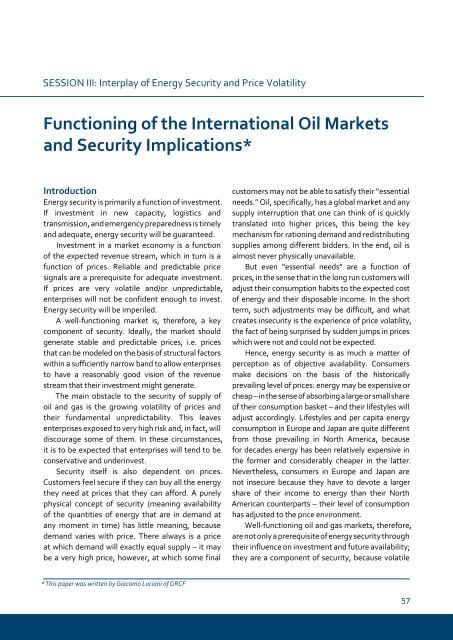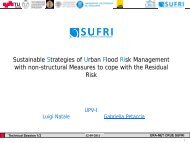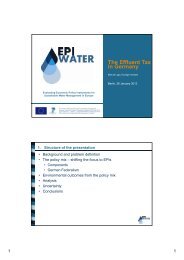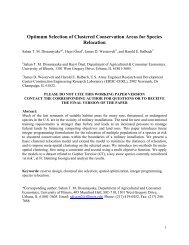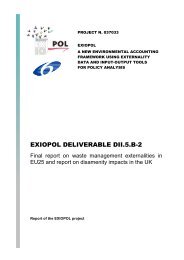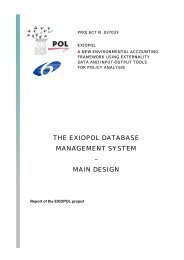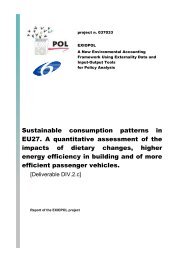Gulf and European Energy Supply Security - Feem-project.net
Gulf and European Energy Supply Security - Feem-project.net
Gulf and European Energy Supply Security - Feem-project.net
Create successful ePaper yourself
Turn your PDF publications into a flip-book with our unique Google optimized e-Paper software.
SESSION III: Interplay of <strong>Energy</strong> <strong>Security</strong> <strong>and</strong> Price Volatility<br />
Functioning of the International oil Markets<br />
<strong>and</strong> security Implications*<br />
Introduction<br />
<strong>Energy</strong> security is primarily a function of investment.<br />
If investment in new capacity, logistics <strong>and</strong><br />
transmission, <strong>and</strong> emergency preparedness is timely<br />
<strong>and</strong> adequate, energy security will be guaranteed.<br />
Investment in a market economy is a function<br />
of the expected revenue stream, which in turn is a<br />
function of prices. Reliable <strong>and</strong> predictable price<br />
signals are a prerequisite for adequate investment.<br />
If prices are very volatile <strong>and</strong>/or unpredictable,<br />
enterprises will not be confident enough to invest.<br />
<strong>Energy</strong> security will be imperiled.<br />
A well-functioning market is, therefore, a key<br />
component of security. Ideally, the market should<br />
generate stable <strong>and</strong> predictable prices, i.e. prices<br />
that can be modeled on the basis of structural factors<br />
within a sufficiently narrow b<strong>and</strong> to allow enterprises<br />
to have a reasonably good vision of the revenue<br />
stream that their investment might generate.<br />
The main obstacle to the security of supply of<br />
oil <strong>and</strong> gas is the growing volatility of prices <strong>and</strong><br />
their fundamental unpredictability. This leaves<br />
enterprises exposed to very high risk <strong>and</strong>, in fact, will<br />
discourage some of them. In these circumstances,<br />
it is to be expected that enterprises will tend to be<br />
conservative <strong>and</strong> underinvest.<br />
<strong>Security</strong> itself is also dependent on prices.<br />
Customers feel secure if they can buy all the energy<br />
they need at prices that they can afford. A purely<br />
physical concept of security (meaning availability<br />
of the quantities of energy that are in dem<strong>and</strong> at<br />
any moment in time) has little meaning, because<br />
dem<strong>and</strong> varies with price. There always is a price<br />
at which dem<strong>and</strong> will exactly equal supply – it may<br />
be a very high price, however, at which some final<br />
* This paper was written by Giacomo Luciani of GRCF<br />
customers may not be able to satisfy their “essential<br />
needs.” Oil, specifically, has a global market <strong>and</strong> any<br />
supply interruption that one can think of is quickly<br />
translated into higher prices, this being the key<br />
mechanism for rationing dem<strong>and</strong> <strong>and</strong> redistributing<br />
supplies among different bidders. In the end, oil is<br />
almost never physically unavailable.<br />
But even “essential needs” are a function of<br />
prices, in the sense that in the long run customers will<br />
adjust their consumption habits to the expected cost<br />
of energy <strong>and</strong> their disposable income. In the short<br />
term, such adjustments may be difficult, <strong>and</strong> what<br />
creates insecurity is the experience of price volatility,<br />
the fact of being surprised by sudden jumps in prices<br />
which were not <strong>and</strong> could not be expected.<br />
Hence, energy security is as much a matter of<br />
perception as of objective availability. Consumers<br />
make decisions on the basis of the historically<br />
prevailing level of prices: energy may be expensive or<br />
cheap – in the sense of absorbing a large or small share<br />
of their consumption basket – <strong>and</strong> their lifestyles will<br />
adjust accordingly. Lifestyles <strong>and</strong> per capita energy<br />
consumption in Europe <strong>and</strong> Japan are quite different<br />
from those prevailing in North America, because<br />
for decades energy has been relatively expensive in<br />
the former <strong>and</strong> considerably cheaper in the latter.<br />
Nevertheless, consumers in Europe <strong>and</strong> Japan are<br />
not insecure because they have to devote a larger<br />
share of their income to energy than their North<br />
American counterparts – their level of consumption<br />
has adjusted to the price environment.<br />
Well-functioning oil <strong>and</strong> gas markets, therefore,<br />
are not only a prerequisite of energy security through<br />
their influence on investment <strong>and</strong> future availability;<br />
they are a component of security, because volatile


